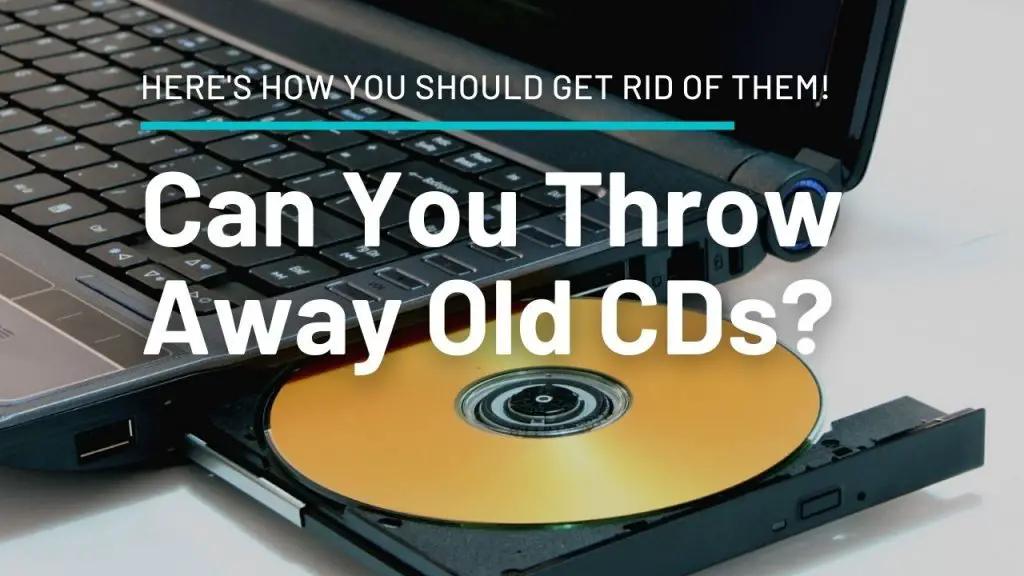When the Compact Disc first came into the equation, they were revolutionary and were a great storage option. However, the world has moved into a completely digital age. All the media that CDs were used for is now downloadable in seconds. Modern laptops and computers don’t even feature CD-Roms or DVD-Roms.
It would be best if you never threw away old CDs. If they end up in a landfill, it’s estimated that they could last for up to 1 million years. If they end up in an incinerator, they can release hydrochloric acid, sulfur dioxide, and dioxins into the atmosphere.
One disadvantage of this innovation is that it led to many CDs being put away in storage. People are becoming increasingly more environmentally conscious and are more considerate of how they dispose of their old stuff.
When it comes to CDs, there are several methods you can use to get rid of them. However, you shouldn’t just throw them away.
Why can’t you throw away old CDs?
When you buy a CD, it often comes with more components than just a disc. CDs include the disc itself, a case, and paper notes that are a part of the case. Only a few of the components are recyclable.
Throwing away the whole case, including the CD, means that most of it go straight into the landfill. Researchers’ estimates indicate that the CD can decompose in a landfill for around one million years.
They take so long to decompose because CDs are made from polycarbonate plastic. These plastics fall under the no.7 category and can be significantly more challenging to recycle.
Often CDs also feature traces of gold and aluminum. Both are easily recyclable materials.
In the worst-case scenario, if CDs are burned, they release toxic chemicals into the air. These harmful chemicals include hydrochloric acid, sulfur dioxide, and dioxins. Another dangerous component of Polycarbonate plastic is BPA, which can cause reproductive problems, early puberty, blood pressure, and heart issues.
Alternative Disposal Options
Instead of throwing them in the trash, multiple disposal options are available to help eliminate CDs more environmentally conscious. Here are all the different options available.
Community Pick-Up and Drop-Off Centers
Most communities offer regular recycling drop-off centers. More often than not, these centers don’t accept plastic CDs.
However, there’s no harm in checking community sources to see if they recycle compact discs. Even if you can’t dispose of the disc, the CD case and notes are widely accepted at all recycling centers.
Additionally, suppose there isn’t a place that handles compact disc recycling. In that case, you can check nearby areas to see any sites nearby. Several online tools and databases allow you to find these centers without hassle.

Donate CDs
Instead of throwing them away, many organizations and children’s hospitals will be happy to take those CDs off your hands. These aren’t the only donation options available to CD owners.
The troops, goodwill organizations, and the salvation army will take the CDs off your hands. After taking the CDs, they’ll also provide you with a tax receipt.
The CDs or DVDs at home that you no longer use need not be disposed of in landfills. As long as they’re being used, they will serve a purpose and reduce the overall demand for CDs.
Resell Them
Speaking of reducing the overall demand for CDs, reselling your collection will reduce the need for newer CDs. The lower the demand for CDs, the fewer CDs are being manufactured, which is better for the environment. Several music resellers or secondhand stores will happily offer you a price for your CDs.
You won’t be able to get rid of blank or burned CDs using this technique, but any software, music CDs, or DVDs are all game.
Mail-in Options
While the number of recycling centers and green organizations is increasing worldwide, they aren’t accessible to everyone. However, organizations like GreenDisk help ensure that people without access to recycling centers can mail in their old CDs.
Specialized CD recycling involves cleaning, grinding, blending, and compounding CDs into reusable plastic. The plastic is reused for auto parts, equipment, and street lights.
Specific organizations won’t charge anything for the donation, and you’ll have to pay the postage fee. On the other hand, other organizations will do the job for you for a minimal cost.
DIY Options
Instead of throwing the CDs away, you can get creative and find a new purpose for them instead of throwing them all out. They can use the CDs for DIY craft projects if they have kids.
They will need a little glue and all the equipment in your craft box. With a little bit of repurposing, CDs can serve multiple different functions.
Paint them up, and they’ll work as fun tree ornaments. They can also be handy as drink coasters and function as an ice-scraper in wintery conditions. Another brilliant option is supplementing frames and mirrors by cutting the disc into pieces.
There are endless options, and the only limitation is your creativity. Instead of letting the discs rot away or throwing them in a landfill, repurposing them is a useful avenue.
Important things to consider before throwing away CDs
CDs are available in CD-R and CD-RW formats. CD-RW stands for rewritable discs, and people often use them to store all kinds of information. That’s why it’s essential to ensure that you dispose of the CDs so that no one can access the information.
When you send the discs for recycling, anyone can pick up the CD, pop it into the drive, and access the information. That’s why it’s essential to take all the necessary precautions.
There are several steps users can take to recycle their CDs without risking a breach of information. The first option is to break the disc in half. Potential recyclers can also scratch the CD’s optical surface, making it impossible for the disc to be read.
Conclusion
CDs are made of polycarbonate plastic which is hard to recycle and may take up to a million years to decompose in a landfill. They can also release toxic chemicals when burned.
Instead of throwing CDs away, one could consider recycling through community pick-up and drop-off centers, donating to organizations, reselling, or mailing them to specialized recycling facilities. It is also noted that since the world has moved into a completely digital age, people are becoming more environmentally conscious and are looking for more considerate ways of disposing of their old CDs.

